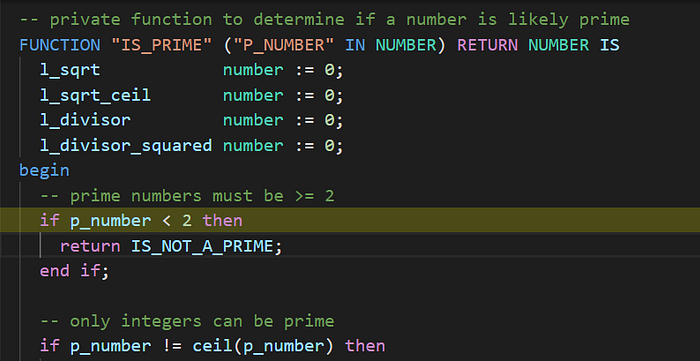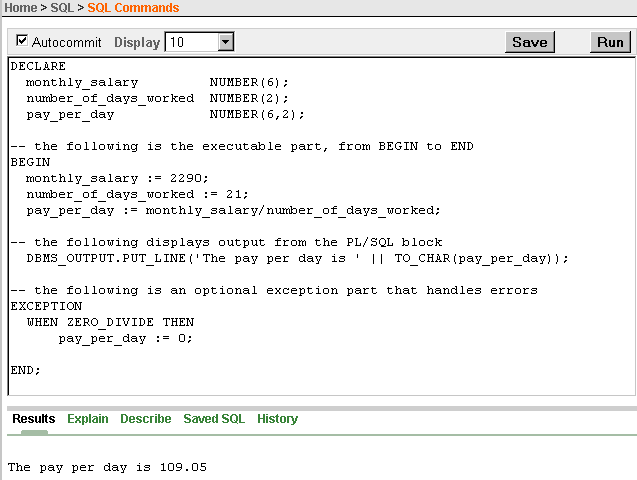PL SQL
WHAT IS PL SQL?
- PL/SQL (Procedural Language/Structured Query Language) is a programming language specifically designed for managing and manipulating data in Oracle databases.
- It extends the capabilities of SQL by adding procedural programming constructs, such as variables, loops, conditions, and exception handling, allowing developers to create powerful and sophisticated database applications.
- PL/SQL is closely integrated with the Oracle Database and is used to write stored procedures, functions, triggers, and packages.
- It provides a robust and efficient way to handle complex data processing tasks and enables developers to create scalable and reliable database applications.

USE OF PL SQL
PL/SQL is commonly used to write stored procedures, which are named blocks of code stored within the database. Stored procedures allow you to encapsulate complex business logic and database operations, making them reusable and easily callable from various applications. They can improve performance by reducing network overhead and promoting code reuse.
PL/SQL is used to perform data manipulation and querying operations within the database. With PL/SQL, you can write complex SQL statements and execute them efficiently. PL/SQL’s procedural constructs allow you to loop through result sets, conditionally execute statements, and handle exceptions, providing more flexibility in data processing compared to standard SQL.
PL/SQL is commonly used to define triggers, which are special types of stored procedures that automatically execute in response to specific database events. Triggers are useful for implementing data validation, enforcing business rules, maintaining data integrity, and auditing changes in the database.
PL/SQL is often employed for batch processing and Extract, Transform, Load (ETL) operations. It allows you to write complex data transformations, automate data loading and integration tasks, and handle large volumes of data efficiently. PL/SQL’s ability to process data in bulk and perform batch operations makes it well-suited for these types of data-intensive tasks.
WHAT ARE THE FEATURES OF PL SQL?
Procedural Language – PL/SQL is a procedural language, meaning it supports procedural programming constructs such as variables, control structures (if-else, loops), subprograms (procedures and functions), and exception handling. This allows you to write complex business logic and control the flow of execution in a structured manner.
SQL Integration – PL/SQL is tightly integrated with SQL, allowing you to embed SQL statements directly within the code. You can execute SQL queries and manipulate database objects seamlessly, making it easy to work with data stored in the database. PL/SQL also supports dynamic SQL, allowing you to construct and execute SQL statements at runtime.


Strong Data Manipulation Capabilities – PL/SQL provides a rich set of data manipulation capabilities, including bulk processing. You can efficiently process large volumes of data using bulk operations such as FORALL statements and BULK COLLECT clauses, improving performance and reducing context switching between PL/SQL and SQL.
Exception Handling – PL/SQL offers robust exception handling mechanisms, allowing you to handle errors and exceptions gracefully. You can catch specific exceptions, handle them appropriately, and take corrective actions as needed. PL/SQL provides built-in exception types and allows you to define custom exception handlers, enabling effective error management.
Modularity and Code Reusability – PL/SQL supports modularity through the use of subprograms, such as procedures and functions. You can encapsulate reusable code blocks into subprograms, making your code more modular and maintainable. This promotes code reusability and improves development productivity.
THE BENEFITS OF LEARNING TO CODE WITH PL SQL
Efficient Database Development – PL/SQL is specifically designed for database development, making it a valuable skill for working with Oracle databases. By learning PL/SQL, you can write efficient and optimized code to interact with the database, perform complex data manipulations, and implement business logic directly at the database level. This results in faster and more efficient database operations.
Seamless Integration with SQL – PL/SQL seamlessly integrates with SQL, allowing you to embed SQL statements within your PL/SQL code. This integration enables you to leverage the power of SQL for querying and manipulating data, while also providing the flexibility and control of a procedural programming language. You can easily handle complex data operations and leverage the capabilities of the underlying database.
Enhanced Data Security and Integrity – PL/SQL allows you to enforce data security and integrity rules at the database level. By writing PL/SQL code, you can implement robust validation checks, data constraints, and business rules directly within the database. This ensures the consistency and integrity of the data, preventing unauthorized access and maintaining data quality.
Improved Performance and Scalability – PL/SQL offers various features and techniques for optimizing performance and scalability. You can leverage bulk operations, efficient cursor management, and optimized query execution plans to enhance the performance of your database applications. PL/SQL also provides tools for tuning and optimizing SQL statements, resulting in faster and more responsive applications.
